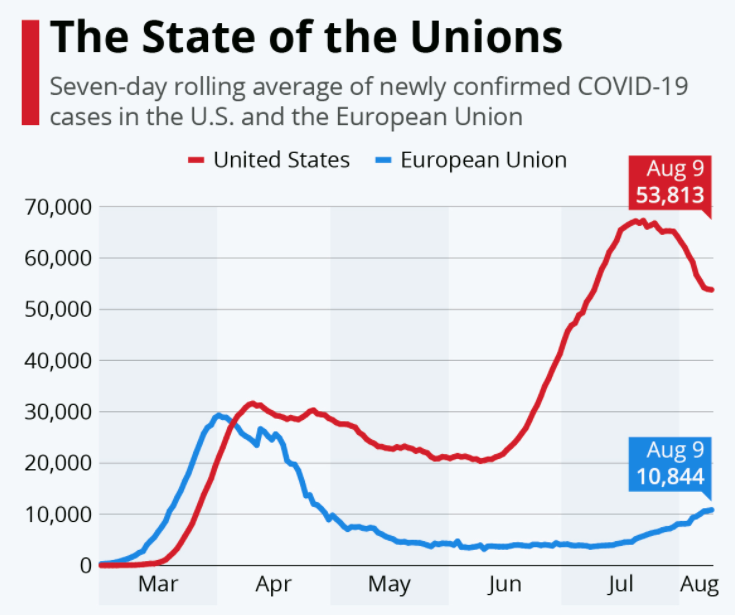COVID-19 Pandemic - Europe

BY: RHEA JOSHI
The following article is a brief description of the current predicament faced in the European region of the world with regards to the current COVID-19 Pandemic. All of the sources utilized to formulate this brief analysis have been referenced towards the end of the page.
There have been 3,351,222 confirmed cases of COVID-19 across the whole of Europe since January 25th, after the first case found in France. Russia is currently the worst affected country in Europe, as of August 11th, with 897,599 confirmed cases, followed by Spain with 322,980 cases. Due to coronavirus, all European countries have also participated in lockdown or quarantine. Countries, such as Vatican City and Malta, don’t have as many cases due to its small size and population. The United Kingdom has 311,641 cases. Countries other than the United Kingdom have just under 3 million cases.
The EU (European Union- Austria, Belgium, Bulgaria, Croatia, Republic of Cyprus, Czech Republic, Denmark, Estonia, Finland, France, Germany, Greece, Hungary, Ireland, Italy, Latvia, Lithuania, Luxembourg, Malta, Netherlands, Poland, Portugal, Romania, Slovakia, Slovenia, Spain and Sweden) have all worked together to help fight against the coronavirus. In fact, the EU has adopted 10 distinct measures in an effort to combat this pandemic within their respective regions. In an effort to minimize the transmission of the virus throughout the union and beyond, borders of all countries, deemed as meant for non-essential travel within the EU, have been closed while maintaining green lanes open for essential resources. Traveling outside of the EU has also been strongly advised against, though some travel restrictions were lifted since July 1st, 2020.
The EU is additionally working towards providing medical equipment for all COVID-19 patients to avert the shortage of medical supplies while also funding 18 research projects and 140 teams through the EU’s Horizon 2020 research program to develop an effective vaccine. An online pledging marathon was also adopted within the EU to generate more funding for the research of a COVID-19 vaccine. Raising about €15.9 billion, the governments involved have agreed to ensure universal access to COVID-19 medications.
Furthermore, the EU has provided almost €36 billion in financial support to help with the health crisis and humanitarian needs. Also, the EU has shown support towards freezing debt for developing countries. As such, the EU is not only focusing on the public health aspect of the pandemic but also the economics aspect. In fact, the EU is even striving to protect the jobs of all citizens by providing financial stability to allow residents of the union to maintain their jobs despite the current predicament they are faced with in this pandemic.
Building on the present financial situation and public health emergency caused by the coronavirus, people have been made redundant and, in the United Kingdom, some people have only 80% pay due to the pandemic. However, as the situation is improving, many people have made their way back to work and may also proceed with meeting up, but must follow all government guidelines such as wearing a mask when in stores or serving customers when working. As a united world, global efforts are being made to help make this situation better and to help restore everything back to the way life was prior to the prevalence of the COVID-19 pandemic.
Image Source: John Hopkins University

References
- 10 things the EU is doing to fight COVID-19. (2020, July 01). Retrieved August 13, 2020, from https://www.consilium.europa.eu/en/policies/coronavirus/10-things-against-covid-19/
- Coronavirus Cases:. (n.d.). Retrieved August 13, 2020, from https://www.worldometers.info/coronavirus/
- COVID-19 situation update worldwide, as of 13 August 2020. (2020, August 13). Retrieved August 13, 2020, from https://www.ecdc.europa.eu/en/geographical-distribution-2019-ncov-cases
- Stewart, C. (2020, August 12). Europe: COVID-19 cases, by country. Retrieved August 13, 2020, from https://www.statista.com/statistics/1104837/coronavirus-cases-europe-by-country/
